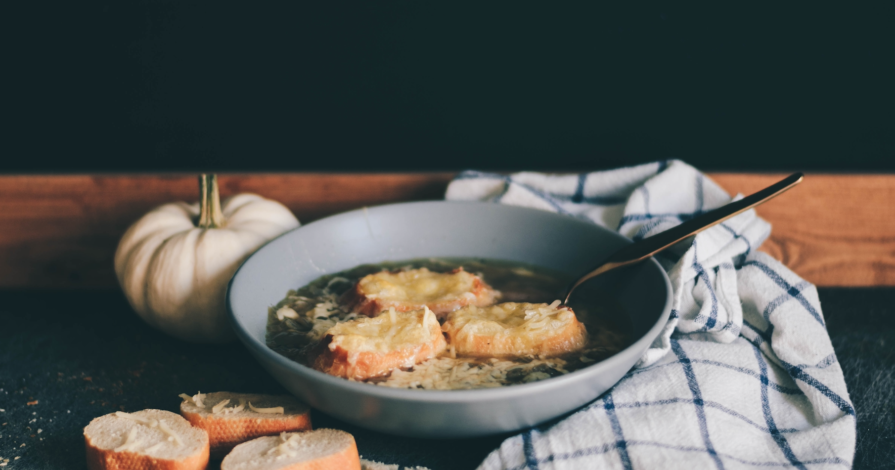L’arrivo del freddo richiama, immediatamente, un piatto che adoro: le zuppe!
Mi piacciono fatta in ogni modo e con ogni ingrediente a disposizione, l’importante è che siano bollenti!
La zuppa calda (oppure vellutata o minestra che sia) è uno dei miei comfort food preferiti in assoluto, in questa stagione.
Quale vino abbinare alle zuppe e alle minestre?
Dipende dalla tipologia, come sempre.
Se la minestra è fatta con del brodo leggero (vegetale o di carne), ma al suo interno ha della pasta o del riso, si può abbinare un vino bianco giovane, leggero di corpo, con una buona acidità e con un bouquet di aromi floreali e vegetali (come un Colli Euganei Bianco o un Leverano Bianco).
Le creme, ovvero minestre legate da addensanti quali farina o besciamella, possono essere servite con vini bianchi giovani di discreta struttura, morbidi e fresco (come Lessini-Durello o l’Asprinio di Aversa).
Per le vellutate (che adoro forse più di tutte), dove in genere si aggiunge burro o uova per renderle “lisce”, si può optare per un vino bianco giovane ma di moderato contenuto alcolico e con un bouquet vegetale e aromatico (come Sauvignon o Falanghina).
I minestroni, più ricchi e complessi di sapori, che prevedono una base di soffritto e verdure varie tra le quali anche i legumi, si abbinano piuttosto bene a vini bianchi secchi di buona struttura e corpo, fresco e con marcate note di frutta fresca e sedano (come Lugana o Trebbiano D’Abruzzo).
Infine per le zuppe vere e proprie, a base di pane e crostini abbrustoliti e brodo di verdura o carne (quindi più pesante delle minestre di cui sopra), si possono abbinare vini rossi giovani di medio corpo, leggermente tannici e con una moderata gradazione alcolica e bouquet di di aromi vinosi e di frutta (come Cabernet o Chianti Colli Senesi).
Se la zuppa, invece, è a base di pesce si può variare con un vino bianco secco di buona struttura che abbia un bouquet intenso di frutta matura (come Pinot Grigio o Verdicchio).
Avete altri suggerimenti?
Scrivetemeli nei commenti.
Alla vostra salute!
—
English version.
Cold calls for a dish that I love: the soups!
I like made in every way and with every ingredient available, the important thing is that they are hot!
The hot soup is one of my favorite comfort food ever in this season.
Which wine to combine with soups?
It depends on the type, as always.
If the soup is made with light broth (vegetable or meat), but inside it has pasta or rice, you can combine a young white wine, light in body, with a good acidity and with a bouquet of floral aromas and vegetables (like a Colli Euganei Bianco or a Leverano Bianco).
The creams, or soups tied by thickeners such as flour or béchamel, can be served with young white wines of decent structure, soft and fresh (like Lessini-Durello or the Asprinio di Aversa).
For the velvety (which I love perhaps most of all), where you generally add butter or eggs to make them “smooth”, you can opt for a young white wine with moderate alcohol content and a vegetable and aromatic bouquet (such as Sauvignon or Falanghina).
Minestrone, richer and more complex of flavors, which include a base of sauté and various vegetables, including vegetables, are very well matched with dry white wines with good structure and body, fresh and with marked notes of fresh fruit and celery (like Lugana or Trebbiano D’Abruzzo).
Finally, for real soups, based on bread and toasted croutons and vegetable or meat broth (therefore heavier than the aforementioned soups), you can pair young, medium-bodied, slightly tannic and with a moderate alcohol content and bouquet of wine and fruit aromas (such as Cabernet or Chianti Colli Senesi).
If the soup, however, is based on fish can be varied with a dry white wine with a good structure that has an intense bouquet of ripe fruit (such as Pinot Grigio or Verdicchio).
Do you have any other suggestions?
Write them to me in the comments.
Cheers!



what do you think?